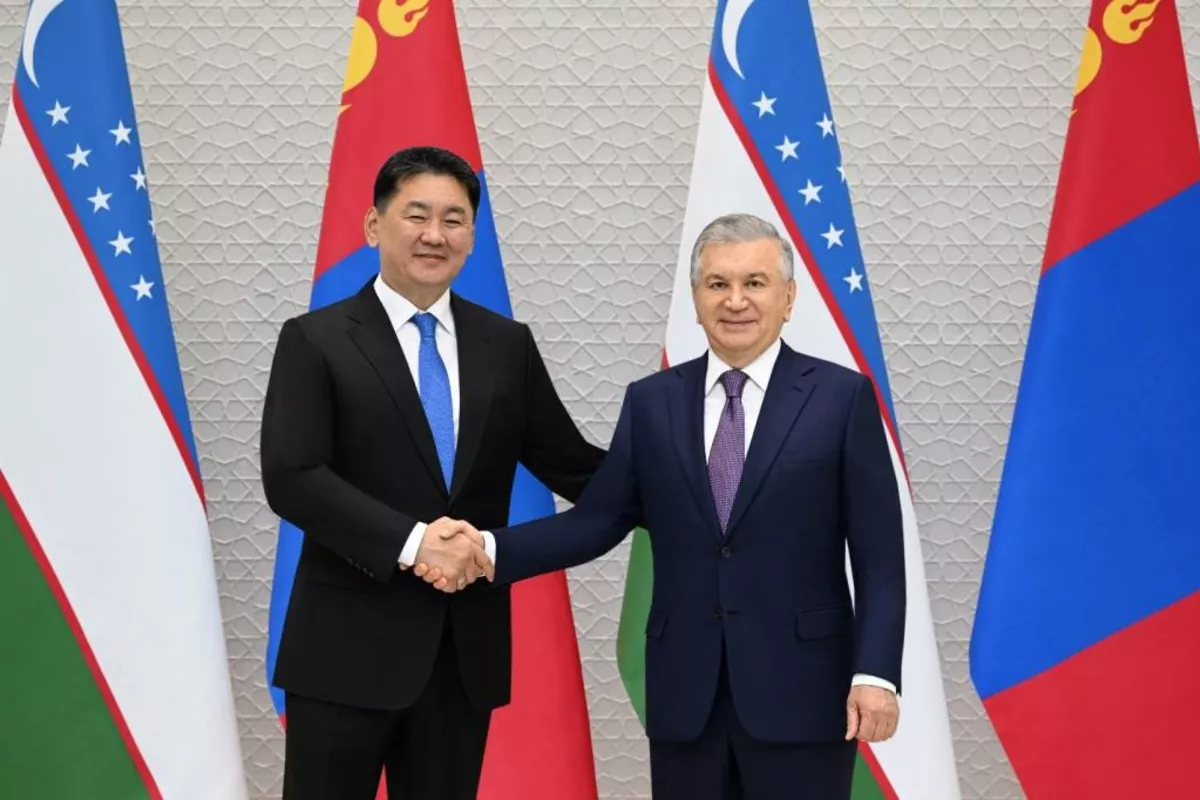
Photo: uza.uz
Despite lacking a shared border or close geographical proximity, Uzbekistan and Mongolia continue to make steady strides in strengthening their political, economic, and investment relations.
Since the establishment of diplomatic ties in January 1992, both nations have consistently advanced their bilateral cooperation, moving toward a new and more robust level of partnership, The Caspian Post reports citing UzA.
Political Dialogue and Diplomatic Engagements
Mongolia recognized Uzbekistan’s independence in December 1991, and official diplomatic relations were established in January 1992. Political dialogue has evolved steadily over the past three decades, bolstered by high-level contacts. The Presidents of Mongolia, Tsakhiagiin Elbegdorj and Ukhnaagiin Khurelsukh, have made multiple visits to Uzbekistan, participating in Shanghai Cooperation Organization (SCO) summits - a clear sign of Mongolia’s commitment to regional integration.
The first official state visit of President Ukhnaagiin Khurelsukh to Uzbekistan was of particular significance, held on June 23-26, 2024. The visit marked a milestone in the history of bilateral relations and resulted in the signing of key intergovernmental and interagency agreements. Furthermore, the official opening of the Embassy of Mongolia in Tashkent symbolized both the stability of the partnership and a strong willingness to deepen cooperation.
Interparliamentary and Intergovernmental Cooperation
A notable boost to bilateral relations came in 2024, establishing a Mongolia - Uzbekistan Interparliamentary Cooperation Group within the Mongolian State Great Khural. In February 2025, the first session of the Joint Intergovernmental Commission was held, marking a shift from diplomatic dialogue to institutional partnership.
Government-level contacts have intensified in recent years. A meeting between the Prime Ministers took place in Bishkek in October 2023, followed by a business forum and the inaugural session of the Business Council in February 2025. These developments underscore a shared commitment to building a sustainable framework for bilateral cooperation.
Economy, Trade, and Investment: Keys to Sustainable Growth
Economic and trade cooperation between Uzbekistan and Mongolia is experiencing stable growth. The robust increase in trade turnover in recent years reflects a growing mutual interest.
From 2018 to 2023, trade turnover between the two nations expanded by more than 8.8 times. The most significant surge occurred between 2021 and 2022, with trade volume nearly tripling, followed by a further 76% increase in 2023. This upward trend continued into 2024, with turnover rising by an additional 47% year-over-year - an indication of consolidated progress and expanding cooperation in key sectors.
Preliminary data for the first four months of 2025 shows trade volume growth exceeding 11% compared to the same period of the previous year. If this pace is maintained, a new annual record in bilateral trade is likely to be achieved.
In 2023, Uzbekistan’s exports increased by 229%, and in 2024, overall trade rose by 46.8%. Uzbekistan’s primary exports include agricultural and industrial products. Mongolia has ramped up its livestock exports, delivering more than 7,000 head of livestock to Uzbekistan in December 2024.
Currently, 17 joint ventures are operating in Uzbekistan, including 12 with 100% Mongolian capital, mainly in trade and services. Both sides are exploring further diversification opportunities, including logistics, agro-processing, and machinery manufacturing.
Investment Cooperation: Plans and Prospects
Investment cooperation is in an active development phase. Two key agreements - on mutual investment protection and preferential trade - are under negotiation. Their adoption is expected to enhance both countries’ business climate and market attractiveness significantly.
The mutual interest in technological exchange was reaffirmed during a delegation visit to Ulaanbaatar in April 2025, led by Uzbekistan’s Deputy Minister of Investments I. Kasimov. The delegation visited companies operating in the food processing and innovative construction sectors, paving the way for potential localization of Mongolian-backed manufacturing in Uzbekistan.
Transport and Logistics: Building Sustainable Connectivity
In June 2024, international road and air transport agreements were signed, representing a breakthrough in bilateral logistics cooperation. Once Mongolia completes its internal ratification procedures, opening direct routes is anticipated, facilitating the movement of goods and people while reducing transportation costs.
Cultural and Humanitarian Exchanges
A significant development in people-to-people relations was the mutual introduction of a 30-day visa-free regime by Uzbekistan in 2018 and Mongolia in 2022. This initiative promotes tourism and strengthens informal diplomacy between the nations.
Conclusion
Overall, relations between Uzbekistan and Mongolia are steadily evolving and driven by pragmatism and mutual benefit. In the face of global uncertainty, both countries are committed to deepening cooperation based on economic complementarity, diplomatic openness, and transportation connectivity.
The future of the Uzbekistan - Mongolia partnership lies in strengthening production chains, expanding mutual investment, and developing resilient trade corridors, positioning their relationship as a vital component of the broader Eurasian regional architecture.
Share on social media